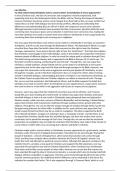Lara Machin –
To what extent should Christians seek to convert others to Christianity at every opportunity?
In most Christian sects, the idea of conversion and evangelism is heavily emphasised, with
supporting texts from the Redemptoris Missio, the Bible, and the ‘Sharing the Gospel of Salvation’,
however Christians should not seek to convert people from their faith as this can cause conflict, but
instead focus on inter-faith dialogue and overcoming conflicts, affecting and celebrating their
differences and understanding they are all true in their own respects to ensure social cohesion.
Although exclusivist and inclusivist views promote this idea of conversion, pluralism holds the most
convincing view, focusing on peace and a reduction in extremism over conversion, thus making the
view that Christians must seek to convert those from others to Christianity at every opportunity less
convincing than other principles such as loving one’s neighbour.
One may argue that Christians must seek to convert others to Christianity if one takes an exclusivist
standpoint, and this can be seen through the Redemptoris Missio. The Redemptoris Missio is a papal
encyclical from Pope John Paul which claims that everyone has the right to hear the Christian
message, expressed as “every person has the right to hear the ‘Good News’”, the Pope then explains
that Christians must engage in inter-faith dialogue, which is the positive and cooperative interaction
between people of different religions, in order to reveal the unique path to salvation through Christ.
This holds strong exclusivist themes and is supported in the Bible in Romans 10:17 which says, “So
then faith cometh by hearing, and hearing the word of God”. Through this, one may argue that
Christians, notably Catholics, should indeed seek to convert others to Christianity at every given
opportunity due to the clear urge from the Pope and through passages in the Bible. However, one
may argue that conversion can be seen as aggressive and may put people off Christianity, as seen
through the crusades, and it is therefore important to focus on respect for others when involving
oneself in interfaith dialogue, acknowledging that God’s revelation is not restricted to Christianity, as
the Catholic Church accepts that non-Christian religions can reflect an element of truth. Through
this, we can see that exclusivism, the Redemptoris Missio, and the Bible supports the belief that
Christians must seek to convert others to Christianity at every opportunity at a large extent, however
this must be done in a way which is not aggressive and focuses on respect and acceptance.
However, some may argue that this method of conversion may not be effective, and it may be
simply left up to God revealing the truth himself. An ethicist may argue that Christians entering in
interfaith dialogue is risky as it may result in Christianity being dampened down and adjusted to
Western society, which was also a concern of Dietrich Bonhoeffer and his theology. Michael Barnes
argues that Christian truth may become relativised through seeking common ground with other
religions. Through this, one can see that the unique message of salvation through Christ may be lost
through having tolerance for other faiths. In addition to this, some ethicists may argue that God
simply reveals himself and there may be no need for evangelism. This idea is supported by Barth
who criticised Christians’ arrogance in claiming to have a ‘monopoly of truth’, and therefore, it can
be argued that Christians should enter the interfaith dialogue, but their sole motive must not be
conversion, but to spread the message of God’s love. Through this, we can see that the exclusivist
perspective on evangelism may not make the statement that Christians must make it their mission to
convert those of other faiths very convincing due to Barnes and Barth’s criticisms.
Christians might seek to convert others to Christianity at every opportunity to a great extent, notably
Christians under the Church of England denomination. This belief can be seen through ‘Sharing the
Gospel of Salvation’, a Church of England text, which claims that salvation only comes through
Christ, and that Jesus uniquely offers salvation, therefore the Church of England’s mission is to
testify this truth and attempts to positively converts others. Although this approach, similarly to the
Catholic Church’s, provides a clear goal for Christians and supports the title statement, one may
argue that this perspective may lead to Christian imperialism, where Christians may misinterpret
these ideas and forcibly convert people of other faiths, however we can see that this counter has
been amended through the idea of structural inclusivism, a concept which aims to develop interfaith
dialogue without competition or aggression. This idea can be found through David Ford’s idea of the
need for common ground to be established and for differences to be celebrated as this forces the
individual to consider their belies. This is also supported through ‘A Common Word’ which is a call




